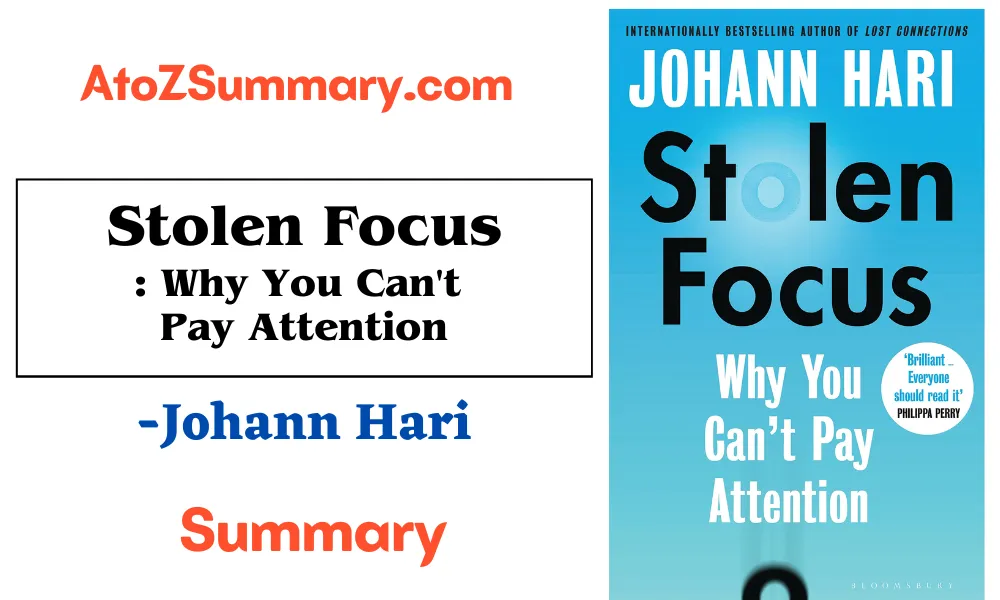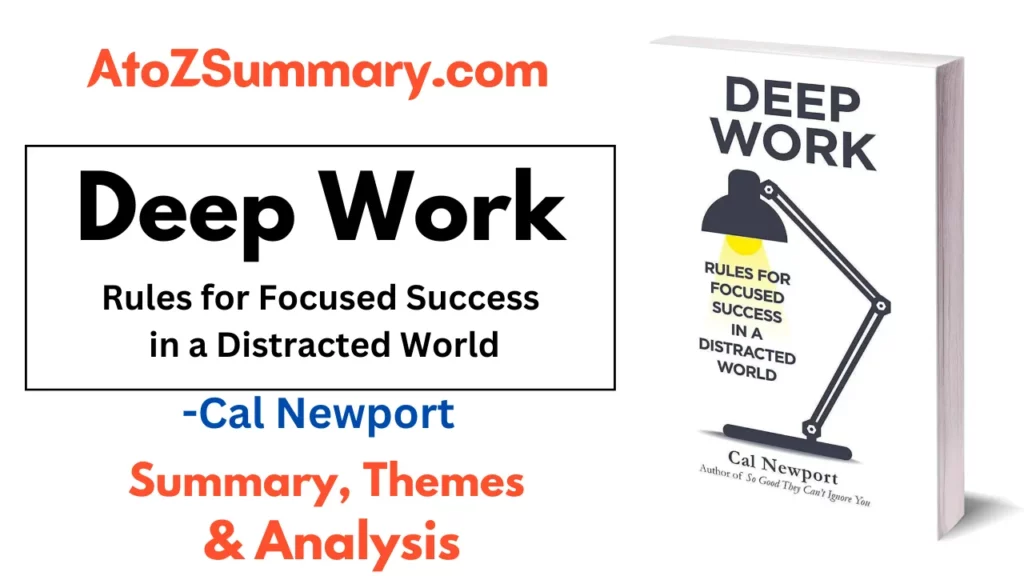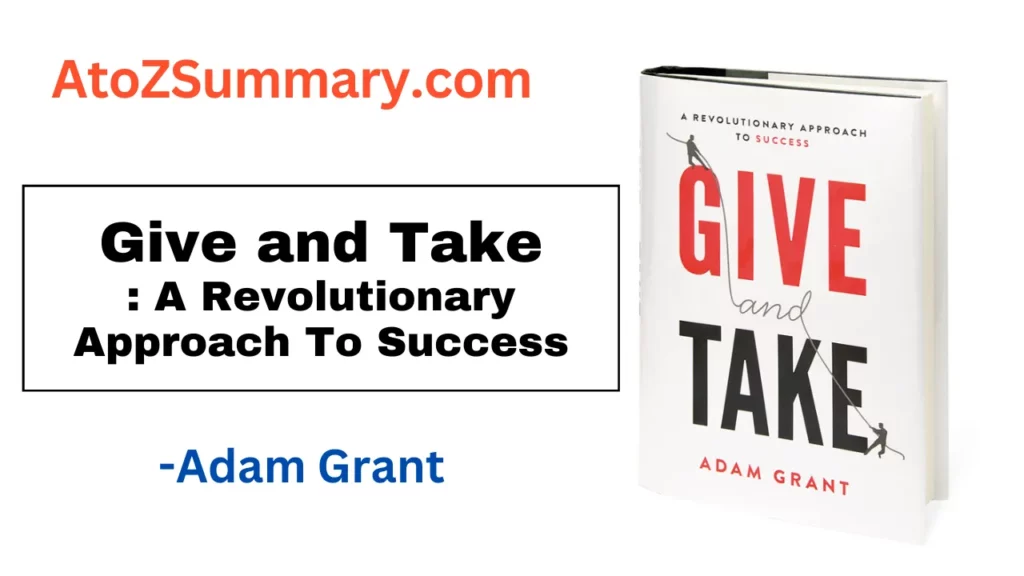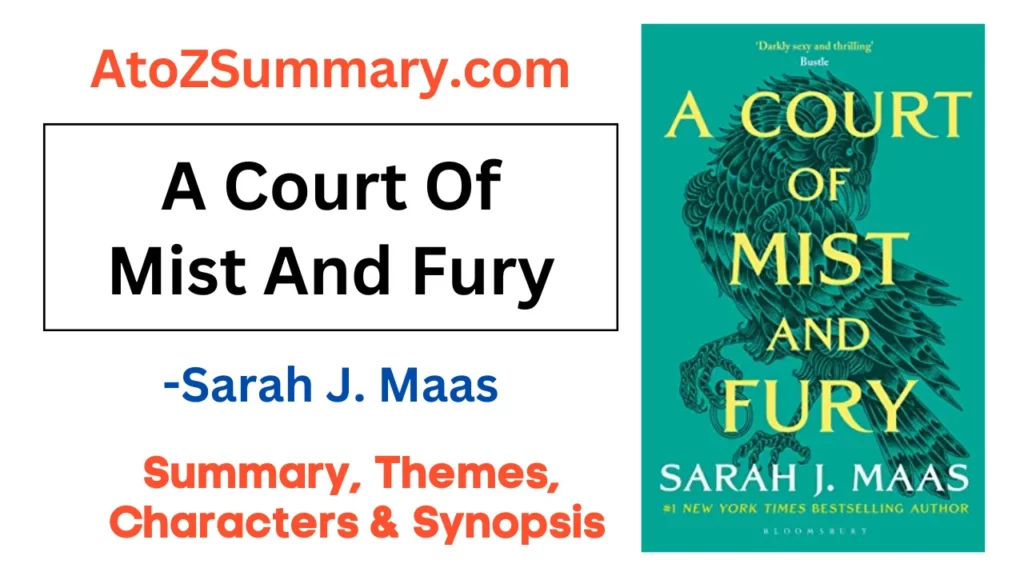| Title | Stolen Focus: Why You Can’t Pay Attention |
| Post Type | Stolen Focus Summary |
| Author | Johann Hari |
| Publication Date | 2022 |
| Publisher | Simon & Schuster Books for Young Readers |
| Genre | Self-help |
| Pages | 368 pages |
To focus means to direct your attention and cognitive resources towards certain components of your surroundings. Our capacity to pay attention & stay focused is becoming less effective in the information era, or, as Johann Hari describes it, being stolen from us by those in power. Everywhere there is an attention crisis.
In the opinion of Hari, 12 separate causes impair attention, thus in this article, I will explain the five most important reasons that I believe account for the majority of our failure to focus.
They are the rise of both mental and physical tiredness, an increase of mind-wandering, the emergence of technology that can follow and influence us, and the rise of stress and how it is provoking alertness.
Not only will I discuss the issues, but I will also discuss five ways for overcoming these issues and improving your attention & focus. So, read this article till the end. Let us begin!
Problem 1
The first and most prevalent issue that has hampered our attention span is an increase in speed, switching, and filtering. There is a tendency of less attention on a single issue and a speeding up trend. While the internet has accelerated this tendency, it has been discovered that the more information there is to take in, the less attention you devote to individual bits.
As a result, we are unable to comprehend the depth of a certain subject since it demands dedication, time and full attention. Furthermore, because the human brain can only focus on one thought at a time, when someone is multitasking, they transfer their attention from one subject to another, leading to them a lot of energy and results in a poor comprehension (switch cost effect).
Problem 2
The growth in physical and mental weariness is the next source of the ongoing attention issue. It is significantly more significant & may possibly be considered the primary reason. Only 15% of individuals feel refreshed when they wake up.
It is critical since getting enough sleep improves cognitive capacities and refreshes the body, invigorating it and refreshing all systems. Inadequate sleep is causing attention issues all across the world. Our bodies begin to exhaust our short and long term memory reserves.
Sleep cycle disturbance has been connected to our capacity to manage light, which in turn affects our natural circadian rhythm. Aside from all other circumstances, only physical and mental tiredness produced by sleep deprivation is sufficient to cause this crisis.
Problem 3
The rise of technology that can track and manipulate you has to be the most obvious reason that comes to mind when one thinks of attention deficiency. The model of social media applications relies on ways to keep us stuck to the app.
They want to gather as much information about us to make a profile with all of our interests to further sell this information to their advertisers. Hence we end up spending the better part of our time scrolling through feeds or constantly checking our phones to see what notifications.
What we fail to see is that this model is causing chronic problems both mentally and physically. Lack of attention is one of them as our ability is severely damaged by the constant interruptions present in our environment.
Problem 4
Mind-wandering has three components; first, you start making sense of the world, then your mind starts making connections between different things, and finally, you start analyzing the past to predict the future.
Mind-wandering is an essential part of being productive. Since there are so many distractions present and our attention keeps diverting towards them, our mind doesn’t get the opportunity to wander, and as a result, we are collectively degrading the quality of our thoughts.
This being said, a wandering mind can sometimes act like a double-edged sword. If the environment is stress and pressure-free, mind-wandering proves to be a creative force, while the opposite is true for stressful environments.
Problem 5
Lastly, the surge in stress leading to vigilance is another leading cause of attention deficits. It has been observed that areas, where there are many environmental stressors such as high crime rate in the neighbourhood, lack of basic resources, abuse of any nature, and absence of caregivers etc, children tend to have more attention problems.
These stressors can prove to be highly traumatic and according to the literature, children who have suffered from four or more types of childhood trauma are 32.6% more likely to have attention and behavioural problems. To pay attention, we need to feel safe, but in the case of children or even adults, they are actively looking out for signs of danger which makes them hyper-vigilant.
This causes a severe reduction in attention-paying mechanisms.These were all the five problems; now going towards the solutions, there are many things that can help us overcome and improve attention deficiency. Here, I am going to share five of them.
Solution 1
It is the solution to increase in speed, switching and filtering problems: To avoid getting distracted by the ever-growing environmental stimuli, one technique that can be used is “pre-commitment.” Many scientific studies have shown that when you pre-plan your actions and inhibit the possible obstacles, it becomes easier to stay focused on the goal and achieve the desired results. For example, cleanse your kitchen from unhealthy foods before going on a diet. It will help you with your diet goal.
Solution 2
It is the solution to the mental and physical exhaustion due to lack of sleep: Make a sleeping schedule and stick to it. Avoid using electronic appliances two hours before bed.Don’t let artificial light enter your room at night. Get a glimpse of morning light when you wake up as it helps regulate the natural sleep cycle.
Solution 3
It is the solution to the rise of technology and its manipulative tendencies: Taking a break from social media can have a significant impact on your ability to pay attention, especially now when we know how the model on which all the platforms work. It can help in slowing you down, avoid getting distracted, and wasting precious time. Make a schedule for months or weeks where you won’t use social media applications.
Solution 4
Solution to dysregulated mind wandering: Staying stuck on a task stops your logical thinking process. That is why, let your mind wander in order to make better sense of the world. Take breaks and allow the wandering to happen. You can practice this by going for walks every day and thinking about the world, how everything fits in.
Solution 5
It is the last solution to the last problem which is the stress that leads to vigilance: In stressful situations, look for resources that can reduce the stress. One way of reducing stress is to find an adequate support system. You can do so by building positive relationships, seeking therapy for emotional support, reaching out and making new friends. Indulging in physical activity is another great way of reducing stress. Mindfulness techniques like meditation and deep breathing exercises also help avoid being hyper vigilant and be actively present in the moment. The simple task of paying attention is in reality the most essential function. Lack of attention causes irritability and gives a sense of failure. All of these are a deterrent to growth and optimal functioning. Hence taking care of our mental faculties should always be a priority rather than an afterthought.
FAQs
What is the book Stolen Focus about?
Stolen Focus is a self help book. It addresses the concentration dilemma as well as the impact of the internet and social media.
Is Stolen Focus worth reading?
Yes, Stolen Focus is worth reading.
About the Author-Johann Eduard Hari
| Field | Details |
|---|---|
| Full Name | Johann Eduard Hari |
| Date of Birth | January 21, 1979 |
| Nationality | British |
| Occupation | Writer, Journalist |
| Known For | “Chasing the Scream: The First and Last Days of the War on Drugs” (2015) |
| “Lost Connections: Uncovering the Real Causes of Depression – and the Unexpected Solutions” (2018) | |
| Awards | -Amnesty International Award for Newspaper Journalist of the Year (2003) -Newspaper Journalist of the Year at the British Press Awards (2011) -Paddy Power Political Book Awards Polemic of the Year for “Chasing the Scream” (2015) -Mind Media Awards for Journalist of the Year (2018) -The Society of Authors’ Richard Asher Prize (2020) |
| @johannhari101 | |
| Official Website | www.johannhari.com |






![Juliet Takes a Breath Summary, Themes, Synopsis & Characters [Novel by Gabby Rivera] Juliet Takes a Breath Summary, Themes, Synopsis & Characters [Novel by Gabby Rivera]](https://atozsummary.com/wp-content/uploads/2023/05/Juliet-Takes-a-Breath-Summary-Themes-Synopsis-Characters-Novel-by-Gabby-Rivera.webp)
![Regretting You Summary, Themes, Synopsis & Characters [Book by Colleen Hoover] Regretting You Summary, Themes, Synopsis & Characters [Book by Colleen Hoover]](https://atozsummary.com/wp-content/uploads/2023/05/Regretting-You-Summary-Themes-Synopsis-Characters-Book-by-Colleen-Hoover-1024x576.webp)

![The Catcher In The Rye Summary, Themes & Characters [by J. D. Salinger] The Catcher In The Rye Summary, Themes & Characters [by J. D. Salinger]](https://atozsummary.com/wp-content/uploads/2023/06/The-Catcher-In-The-Rye-Summary-Themes-Characters-by-J.-D.-Salinger.webp)

